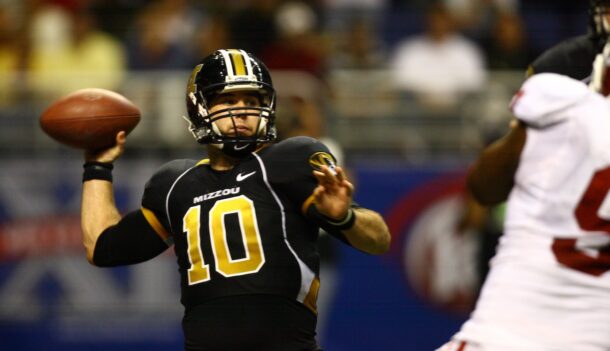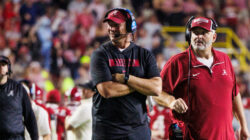
Will Tennessee be the next SEC team to play on artificial turf?
By John Brasier
Published:
Quiz: What do the football teams at Arkansas, Kentucky, Missouri, Ole Miss and Vanderbilt have in common? No they’re not the five northernmost teams in the SEC — but almost.
Hint: They share a home-field characteristic. Some might call it an advantage.
The answer: They play their home games on artificial turf.
Could Tennessee be next?
The grass surface at Neyland Stadium has been widely criticized in the past two seasons. Coach Butch Jones acknowledged the field’s poor conditions on Saturday after the Volunteers slipped past South Carolina.
Jones said he attended a meeting about the field conditions on Monday, two days after South Carolina coach Shawn Elliott told reporters he was “very surprised” about the difficult conditions at Neyland Stadium.
“We’re well aware of it,” Jones said of the field problems at his Monday news conference. “We’re taking every precaution. Everything we can, we’re doing.”
Maybe Tennessee officials took note of how well Missouri’s FieldTurf surface handled downpour conditions last Thursday day as Mississippi State’s Dak Prescott threw for 303 yards — a season high against the Tigers — and four touchdowns.
Players, coaches and fans have always favored good grass playing surfaces, citing “rug burn” on artificial turf and the common belief that artificial turf surfaces are harder and thus cause more injuries.
“Our kids like it a lot better and recruiting’s a lot easier,” Phillip Fulmer said of the grass at Neyland Stadium when he was Tennessee coach. “But I don’t know what difference it makes.”
But modern artificial turf, more cushioned and closer in texture to grass than previous products, must be an attractive alternative.
In the heart of Bluegrass County, Kentucky replaced the natural grass surface at Commonwealth Stadium with FieldTurf, the surface on which two of the last three Super Bowls were played, prior to the 2015 season.
Many players and coaches credit modern artificial surfaces with improving the quality of games, especially late in the year.
“With where we are, our field gets extremely slippery the second half of the year and it really doesn’t look great either and we don’t get to use it a whole lot. It is painful for me as head coach to have beautiful stadium and we can’t use it because it gets all tore up,” said Kentucky coach Mark Stoops. “We have a hard time growing grass. The second half of the season we over seed with rye grass and if that gets wet at all, it gets extremely slippery.
“We want to play with tempo, play fast and want a consistent surface that looks good all the time. We can use it an awful lot and have been in there already. That will only help us. Don’t rip on the artificial turf too bad.”
The growing perception is that a good artificial surface is better than a grass field in poor condition.
“It is difficult when you’re slipping,” Jones said. “I think sometimes it creates hesitation amongst your players.”
Tennessee is the only school among the six northernmost SEC members with a grass field. Ironically, the Vols joined Alabama as the first SEC members to install artificial turf in 1968. But they went back to grass in 1994. Alabama, Texas A&M, Florida and South Carolina have also switched back from turf to grass.
Georgia, Auburn and LSU supporters take great pride in their historic, natural grass field surfaces, which add traditional and aesthetic value to the game-day experience.
There’s a simple reason why five of the six northernmost teams in the SEC play on artificial turf: weather.
Artificial turf playing surfaces have important advantages. Cold weather stunts the growth and weakens grass. Rye grass, used at Tennessee when warm-weather Bermuda goes dormant — can be slick, especially in transition. periods. Rain, snow and ice make conditions sloppy.
With artificial turf, a field easily can be used for other events — concerts, high school games, etc. — without affecting the surface for Saturday games.
Though installation of turf is expensive — Kentucky paid $672,500 — maintenance is much easier and cheaper. Grass doesn’t have to be watered, mowed and protected against disease. Lines don’t have to be repainted for every game.
Though natural grass remains the favorite surface for players and fans, modern alternatives such as FieldTurf provide an attractive alternative for schools where weather conditions can make a major impact, especially in the most important games late in the season.
At Tennessee, expect school officials to carefully examine artificial turf as a possible solution to the field condition problems at Neyland Stadium.







